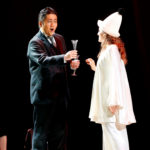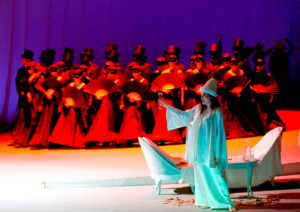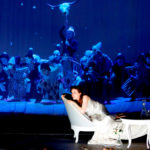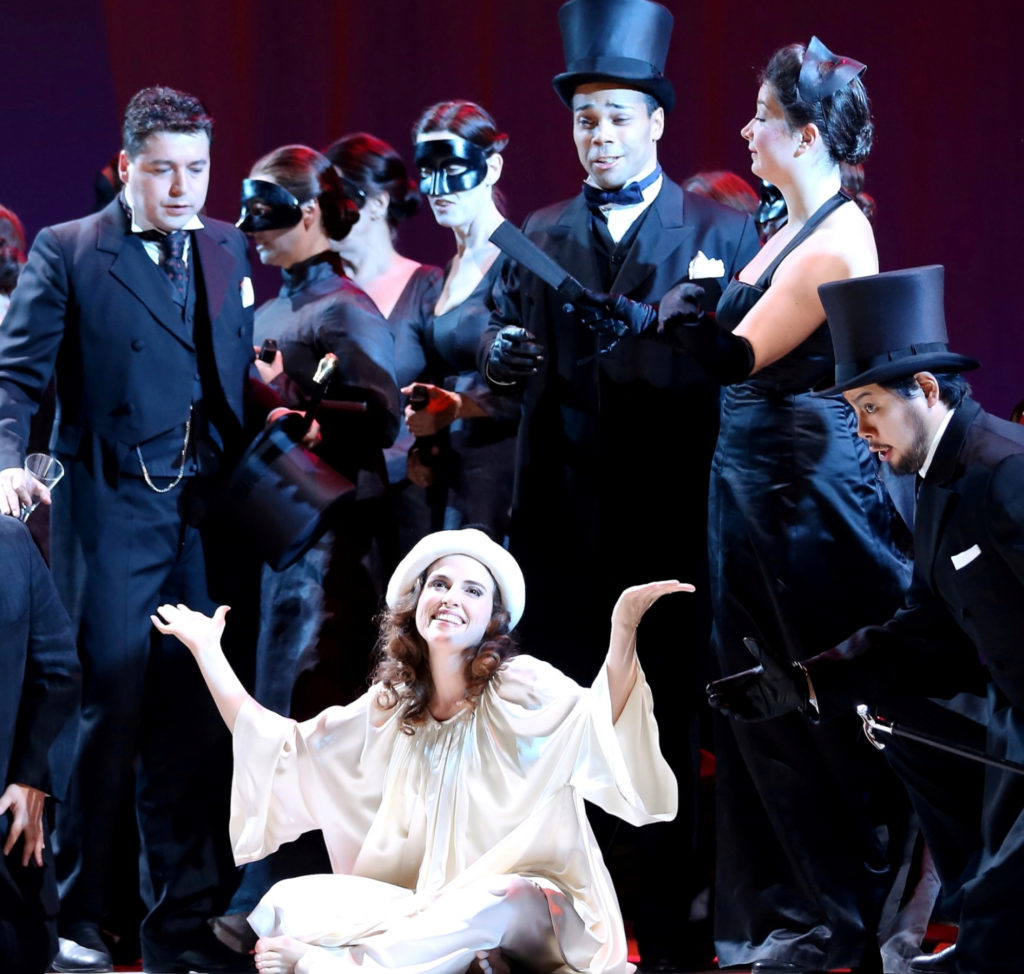Circus-like figures, clowns, strut the stage in the opening chorus. Men in top hats and black frockcoats suggest Paris of the 1860’s; they could even be in an Edouard Manet society painting.
Nelsen’s Violetta, in a white satin slip, moves onto the stage to welcome the guests to her party: the wild troupe crowded into a semi-circular reservation (centre-stage). Alfredo (JunHo You) sings how he wants everyday for her. Nelsen in brilliant white, wearing a peaked clowns hat: contrasting against the toffs, the haute-societé in black dinner dress.
 JunHo You’s drinking song is unexceptional; he clinks champagne glasses with Nelsen centre-stage. It has to be said that You’s Alfredo is only average. Not comparable with Juan Diego Florez’s Vienna State Opera recently. But Simon Stone’s radical staging is superficial, whereas Volksoper’s honest, modest production gets to the heart of the opera. The leading roles, including Gunter Haumer’s Germont father- except for Nelsen’s Violetta- are not what especially commend your visit. Rather it’s the whole concept, Volksoper’s Chorus in the ensembles, the ballet sequences; and Vienna Volksoper Orchestra achieve a high standard (under Alfred Eschwé.)
JunHo You’s drinking song is unexceptional; he clinks champagne glasses with Nelsen centre-stage. It has to be said that You’s Alfredo is only average. Not comparable with Juan Diego Florez’s Vienna State Opera recently. But Simon Stone’s radical staging is superficial, whereas Volksoper’s honest, modest production gets to the heart of the opera. The leading roles, including Gunter Haumer’s Germont father- except for Nelsen’s Violetta- are not what especially commend your visit. Rather it’s the whole concept, Volksoper’s Chorus in the ensembles, the ballet sequences; and Vienna Volksoper Orchestra achieve a high standard (under Alfred Eschwé.)
Nelsen leaves the party shaking, doted over by Alfredo. He urges her to change her life, take care of herself.Junho You has good intonation, but there’s no memorable highpoint. Could this be why their famous Act 1 love duet Un di felice is listless -though he’s singing of ‘a love the hearbeat of the universe.’
But alone, Violetta’s aria, singing of past disappointments- so often in her longings- is fiery. With Alfredo she feels new-born.Ah, fors e lui. A foolish fantasy? (She’s given Alfredo a camellia, to return when it’s faded.) What should I do in the whirlpool of life. Sempre libera, day or night, she’ll enjoy herself.
In the misty, nebulous sequencing of this production, it isn’t clear that Alfredo and Violetta have retreated to the country. She’s given up her life of luxury – that of a ‘courtesan’ – for love. Annina (Katharina Ikonomu) has come from Paris, urgently requesting money for Alfredo. But Violetta again appears bed-ridden.
The visit of Giorgio Germont to plead with this ‘courtesan’/ prostitute not to marry his son out of fear of social opprobium, should be one of the opera’s highlights. Germont’s apparently well-meaning hypocrisy typifies ‘Victorian’ double standards . Here Germont is sung by Günter Haumer, an impressive baritone (from Volksoper’s Carousel to Flying Dutchman.) But although Haumer appears white-haired, his deep timbre doesn’t disguise he’s just too youthful- and gorgeous- for the ‘old man’. Surely he is asking something terrible of her? He looks after the future of both his children. He sings of his daughter ‘as pure as an angel.’
In their duet – Nelsen from her convalescent’s corner- Germont sings,’it will change the roses into thorns if this goes through.’ – Does this mean mean I have to distance myself from Alfredo forever?’ Does he know the love that lies in her heart? Nelsen now standing, hints her end is near. Still more powerful, must she be separated from him, how cruel. Germont, smooth operator sings, she’s only young but people change: even the greatest love doesn’t guarantee happiness.
Germont symbolically removes his jacket. Haumer now holds her from behind, as if caressing her. Violetta, returning to her sickbed: tell your daughter, she sacrifices her own happiness. Nelsen’s unbearably moving. What should she do? – Tell him she doesn’t love him. She, upset: embrace me like a daughter. Germont, what can he do for her. For him it’s all about money, and isn’t she a courtesan? – But she’s sincere, ‘I will die but let my pains not be known.’
Now she has to write to Alfredo. What to say? Nelsen sings, to a piercing oboe accompaniment, Love me as I love you (she writes.) While Alfredo sings triumphantly, she belongs to me, the lady flees to Paris.
Why is he so upset,(Germont asks). My son, how you suffer. Come back home! In Germont’s aria, one of Verdi’s most lyrical, evoking the nostalgia of Provence, he appeals to Alfredo’s family loyalty. Haumer’s beautifully articulated, but a little characterless.
 Act 3 has exceptional staging: scarlet red-frocked Spanish dancers, gypsies in black. Now the matadors brandishing red cloths. Volksoper has Vienna State Ballet on call: the girls in black wearing bulls horns, and centre-stage, a flamenco ritual with two toreadors. Now as if in the ring, Alfredo and David Sitka’s Vicomte are earnestly playing cards. Unlucky in love, but Alfredo can go back home. The Baron Douphol (Ben Connor), rival for Violetta, wants to play. Violetta pleads Alfredo’s in danger. Now the Baron boasts of their relationship. She admits she swore to avoid Alfredo. But Chorus sing, she’ll love him till her death.
Act 3 has exceptional staging: scarlet red-frocked Spanish dancers, gypsies in black. Now the matadors brandishing red cloths. Volksoper has Vienna State Ballet on call: the girls in black wearing bulls horns, and centre-stage, a flamenco ritual with two toreadors. Now as if in the ring, Alfredo and David Sitka’s Vicomte are earnestly playing cards. Unlucky in love, but Alfredo can go back home. The Baron Douphol (Ben Connor), rival for Violetta, wants to play. Violetta pleads Alfredo’s in danger. Now the Baron boasts of their relationship. She admits she swore to avoid Alfredo. But Chorus sing, she’ll love him till her death.
Consummately staged, the guests are lined up to witness Alfredo- who’s won a fortune at cards- throw his money at Violetta’s feet, in payment for ‘amorous advances’. Nelsen, humiliated, collapses in shock, (still refusing to give her true reasons for leaving him.) She sings, God will touch his conscience, then he’ll experience the love she feels. The Chorus sing, how cruel, you’ve broken her heart. In the marvellous choreography, Haumer’s Germont appears rear of stage. Where is ‘my son’, he can no longer recognise Alfredo, and disowns him.
In the Act 3 Finale, now the spotlight is on Violetta’s sick bed, under a pool of light the empty black marble stage. She reads, Giorgio Germonts letter: the Baron wounded, Alfredo abroad. You kept your promise. Nelsen, no diva, but endearingly honest, an empathetic actress; a sensitive soprano, but with an impressive range.
‘Is today a holiday?’ – ‘A carnival’. Annina is by her side. She needs nothing: be quick.  She observes the carnival behind the transparent voile curtains, the figures like apparitions.
She observes the carnival behind the transparent voile curtains, the figures like apparitions.
Alfredo returns: Forgive me. He was guilty. Nothing can separate them…But You’s Alfredo, he’s behind the curtain. They’ll leave Paris for a new life. Is he a vision? He should go to church, she sings, to thank the Lord. Nelsen gets up shakily, as if sleepwalking, but supported by Annina. It’s high drama.
Alfredo observes her, mid-stage, distanced, from behind the curtain. (Why? The effect is perhaps as if she’s drugged, dying, semi-conscious; or is she looking back?)
If Alfredo’s return can’t save her, nothing can. Is he a vision? Nelsen, with terrific high notes, sings defiantly she’s too young to die; her hope was a dream. The spectre, centre-stage, of her ghost. Curious, she sings, the pain is weakening. She appears coming back to life. Then collapses. (Her ghost rises.)
Magnificent stagecraft, convincing, eschewing any sentimentality. And Verdi’s sublime music, Vienna Volksoper Orchestra and Chorus exceptional under Alfred Eschwé. A young Spanish couple I spoke to on their first ever visit to the opera, couldn’t quite understand it- German subtitles?- but Verdi’s music is universal. They’ll be back! © P.R. 6.3.22
Photos: JunHo You (Alfredo Germont), Rebecca Nelsen (Violetta Valéry); Rebecca Nelsen (Violetta), Vienna State Ballet; Rebecca Nelsen, State Ballet; Featured Image Anja-Nina Bahrmann as Violetta
All photos © Barbara Pálffy/ Volksoper Wien

